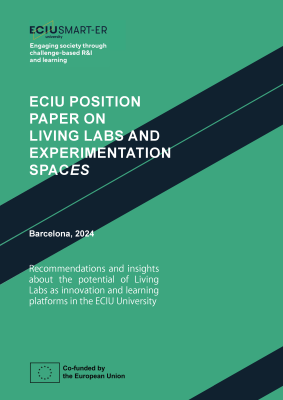ECIU Position Paper on Living Labs and Experimentation Spaces: Recommendations and insights about the potential of Living Labs as innovation and learning platforms in the ECIU University
Keywords:
Living Labs, Urban experiments, Sustainability, Urban transformationSynopsis
To accelerate transformations towards just and sustainable future cities across Europe, local and regional projects need to scale up and share sustainability pathways and planning efforts. In this context, Living Labs, and innovation and experimentation spaces in general, have demonstrated great potential in serving as platforms for connecting universities with societal stakeholder, facilitating transdisciplinary collaboration in the innovation process but also as tools for cross-case learning and upscaling innovative solutions. At the same time there is an ever increasing emergence and diversification of these spaces, even within ECIU, that can often create a certain confusion and at the same time reluctance to engage and make use of them or explore their full potential.
The ECIU-UTC seed project’s objective was to expand existing research and innovation initiatives of the ECIU by linking established living labs and citizen science projects run by partners and their regional ecosystems. This resulted in an initial Roadmap for the distributed network of a “Living Lab and experimentation and innovation spaces” within ECIU, an effort that will continue in the ULALABS project during the next three years where we will open up the process to the extended ECIU ecosystem. The SMART-ER Conference in Barcelona gave us an initial opportunity to share and reflect the Seed project results together with the broader community but also the objectives and scope of the new project.
We envision that the ULALABS project will produce tools, methodologies and experiences that will help the community learn and understand how to make use of these innovative infrastructures to enhance their activity and its impact. At the same time aid with the effort towards the realization of the ECIU 2030 Vision1 by articulating a platform and mechanisms for integrating multi-disciplinary challenge-based research, innovation and learnings; and a distributed network of ECIU physical and virtual collaboration spaces operational and interconnected between the ECIU member universities. In this context, the ECIU consortium in its vision to establish an open, inclusive and collaborative ecosystem should seek to make the existence of the labs visible and promote their active use in teaching, research and innovation activities in future activities.


